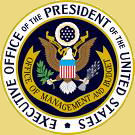September 2008 - Operator certification was top of the list of items under discussion last month at a meeting between officials of the White House Office of Management and Budget (OMB) and industry representatives.
At the meeting held July 28 at the White House OMB offices, the National Commission for the Certification of Crane Operators (NCCCO) testified before a panel of OMB officials as part of an industry appeal, coordinated by the Specialized Carriers & Rigging Association (SC&RA), for OMB to approve passage of the consensus document developed by OSHA’s Crane and Derricks Advisory Committee (C-DAC) in August 2004. A federal proposed rule based on C-DAC would provide a badly needed revision of the current crane requirements developed almost 40 years ago.
a panel of OMB officials as part of an industry appeal, coordinated by the Specialized Carriers & Rigging Association (SC&RA), for OMB to approve passage of the consensus document developed by OSHA’s Crane and Derricks Advisory Committee (C-DAC) in August 2004. A federal proposed rule based on C-DAC would provide a badly needed revision of the current crane requirements developed almost 40 years ago.
NCCCO Executive Director, Graham Brent, noted that twenty one (21) of the twenty three (23) members of the Cranes and Derricks Advisory Committee (C-DAC) supported the operator certification provisions of the final consensus document submitted to OSHA in August 2004. Moreover, Brent stated, the C-DAC consensus document was subsequently unanimously approved in its entirety by OSHA’s Advisory Committee on Construction Safety and Health (ACCSH).
“Much of the industry that uses cranes already certifies their operators,” Brent said, “but some employers are reluctant to do so for fear their lack of training will result in their failing tests.” In many cases a stated opposition to certification masked an underlying reluctance to train, Brent said. “A federal requirement would bring those employers who are reluctant to train and test their employees into line with industry standards.”
He noted that an additional six states had enacted crane operator certification requirements in the four years since the C-DAC report was completed. At least six more states and several cities had introduced legislation or were in the process of drafting it.
“It’s clear that nationwide mandatory crane operator certification is coming,” Brent said. “The only remaining question is: Will this be a state-by-state (city-by-city, county-by-county) process, or a national program that will be uniform for employers everywhere?” Did it really make sense, he asked, for each state, county or city to repeat the work that C-DAC had already done.
Brent noted that a federal requirement for a nationally recognized process would cost employers less than state-by-state licensure that could require mobile crane operators to have 50 different licenses, or worse, if counties (like Florida’s Miami-Dade) mandate their own requirements.
Without the need to purchase a state license, the cost of certification was negligible, he said, noting that CCO certification costs as little as 2¼ cents per hour per employee. “Regardless, the risk management benefits and reduced workers compensation and insurance premiums that certification brings far outweigh the costs of training and certification,” Brent added.
While certification provided the proof that training had been effective (specifically, that crane operators have the requisite knowledge and skill to operate a crane safely), he pointed out that C-DAC contains no restrictions on where or how employers source that training.
“Employers are free to train their own employees or hire in trainers of their choice,” Brent said. “For those that choose to outsource this process, NCCCO lists on its website more than 100 training schools nationwide offering crane-specific training, in addition to numerous trade association chapters and union locals.
Employers concerned they would have insufficient time to comply with the new rule should not worry, Brent said. “C-DAC recommended an additional four years for the operator certification provision to take effect so, even if a Final Rule were published next year, employers would have until 2014 (including the standard one-year compliance period that applied to the entire rule) before they would have to comply.” Accredited certification bodies would have no trouble keeping up with demand, he stated, as evidenced by the four-fold increase NCCCO had experienced in California.
In his concluding remarks, Brent stated, “The bottom line is that certification has been proven to save lives through reducing accidents. The Province of Ontario has demonstrated this conclusively since 1978 with its ongoing study that shows an 80% decrease in crane-related deaths and a 50% reduction in crane and rigging accidents as a percentage of all construction accidents since training and licensing were mandated.”
A similar trend was beginning to emerge in the US, he said, notably in California and other states that had been tracking the benefits of their certification requirements.
View 20 Facts About Crane Operator Certification and the Proposed Federal Rule